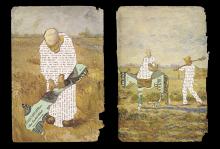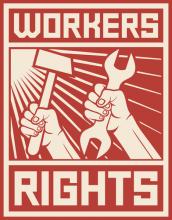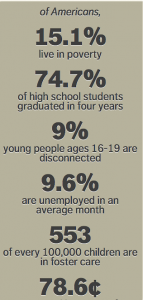Employment

IN A JUST ECONOMY, everyone who wants a job has one, and it pays a living wage, sufficient for workers and their families to thrive. Everyone’s material needs — for nutritious food, safe and secure housing, transportation, clothing, utilities, education, health care, and economic security — are met. Economists call this full employment in living wage jobs, and it is a goal of many justice advocates. It is also God’s vision for society.
Jesus told the disciples that he came so all may have abundant life (John 10:10). As Jesus showed, God’s vision encompasses more than abundant spiritual life. Jesus understood that God’s vision of abundance encompasses material needs as well as spiritual ones. Jesus healed broken bodies. He fed hungry people and encouraged others to do so as well. In God’s reign, everyone’s material needs are filled. But how does God envision this to happen?
The Old and New Testaments reveal a great deal about God’s intentions for the economy, the word we use to describe the way in which we use God-given natural resources — soil, rain, sun, fuels, minerals, trees, etc. — in combination with human effort and ingenuity (also given by God) to produce all our goods and services. We can gain important insights relevant to our economy today by examining the economic circumstances of the Israelites during three different biblical eras and then exploring what the biblical writers and Jesus taught about the economy and economic injustices during those periods.
Over the more than 10 centuries during which the biblical narrative was composed, the economic circumstances of the Israelites changed markedly and, in response, so did the economic instructions in the Bible. But, surprisingly, in each of the three eras, the instructions called for livelihoods for all that enabled thriving or, in our language today, full employment in living wage jobs.
In the Old Testament — the Hebrew Bible — the economic instructions are part of the laws found in Exodus, Leviticus, and Deuteronomy. Today, Christians often insufficiently value this body of law. Some of it seems strange to our modern ears. Other provisions fall far short of current standards for justice — for example, slavery and patriarchy were normalized then. Certainly some of our laws today will fall short of more enlightened future standards. But as we will see below, the law contains much timeless wisdom. To the Israelites, the law was a gift from God, a blessing, a guide to more joyful and fulfilling lives lived in right relationship with God. Psalm 23, one of the most beloved and well-known biblical psalms, tells of the comfort derived from God-the-Shepherd’s rod and staff, tools used to guide sheep in safe, life-giving paths. If we are open to it, we can gain important insights from the ancient laws.

“If I’ve got money, and it’s easy for me to get over and give them money, I do,” Thun said. “What the Lord taught me is, I have a responsibility to give. What they choose to do with the money is between them and the Lord, and he can work with them in regards to stewardship.”

Wilson and Jones’ data reflects that, in 2015 — just as in 1975 — poor black Americans worked more hours than poor white Americans. It also reflects that the labor of black women who work low-wage jobs has increased larger than the labor of any other demographic studied by Wilson and Jones, even demographics that are combinations of racial, gender, and income. Black woman with low-wage jobs have increased their hours of labor since 1979 by 30 percent.

To leave the trafficked sex industry is to encounter many barriers. Among those is the need for employment opportunities and the opportunity to learn a trade while gaining skills to earn an independent income.
Consider this: A woman leaves a trafficker, through his arrest or her own personal escape. This trafficker created total dependence — someone who, amidst abuse and exploitation, provided for her. She usually had no control of this money, and gave over anything she made for his earnings. Her needs are met — but she is completely dependent on him for survival.
Then she is separated from her trafficker, and she has nothing: No income, usually a limited education, and at times minimal job skills to report on a resume. Her survival reflects her strengths and resources — but how does she capture resilience for prospective employers? What does she do when she carries a criminal record history?
One survivor described this experience to me, saying, “I look horrible on paper.”
Human trafficking is an overwhelming and complicated issue.
(Actually the root causes of human trafficking are complex. But there’s nothing complicated about treating people like people, not property).
Yet, how can those with little time to volunteer or a burgeoning desire to make some kind of difference do so?
Support socially responsible businesses! Here are five groups dedicated to helping sell the products of at-risk women and girls, as well as trafficking survivors—supplying them with work and the means to provide for their families.
Engage in smarter buying—invest in women, in their work, and in their futures.

RECENT YEARS HAVE witnessed a deluge of headlines such as “Jobs Become More Elusive for Recent College Grads” from Reuters and “For Recent College Grads, Recessions Equal Underemployment” from Inside Higher Ed—headlines that make even the most hearty college students experience heart palpitations. According to a 2014 analysis by the Federal Reserve Bank of New York, “the underemployment rate for 22-year-olds is about 56 percent, indicating that more than half of the people just graduating end up working in jobs that do not require a degree,” jobs for which they are overqualified.
To put this into perspective: I am a 22-year-old senior at a private Christian university. Of my close friends who graduated in the last year or two, the only ones who were able to find jobs in their fields were education and nursing majors.
Don’t get me wrong, I love liberal arts and feel grateful for the critical thinking skills, study-abroad opportunities, and philosophical discussions that attending a liberal arts school has afforded me. But learning in the same analysis that “only 40-to-45 percent of recent college graduates majoring in communications, liberal arts, business, and social sciences were working in jobs that required a degree” is troubling at best.
In addition, seven out of 10 college seniors are graduating with an average of $29,400 in debt due to rising tuition costs for an undergraduate education. The National Center for Labor Statistics found that in the past decade, the cost of “tuition, room, and board at public institutions rose 42 percent after adjustment for inflation.” The situation was a bit (though not much) better at colleges in the private not-for-profit group, like my own, where the average price rise was 31 percent.

The only way to win the “war on poverty” is for liberals and conservatives to make peace — for the sake of the poor. That would be the best way to mark the 50th anniversary of the war on poverty, declared by President Lyndon Johnson in his January 1964 State of the Union address. Making peace means replacing ideologies with solutions that actually solve the problems of poverty. With both Republicans and Democrats speaking out on poverty this week, and the recession slowly receding this should be an opportunity to find the focus, commitment, and strategies that could effectively reduce and ultimately eliminate the shameful facts of poverty in the world’s richest nation.
For any proposal, the basic question must be whether it helps more people and families rise out of poverty and realize their dreams. This means setting aside political self-interest and thinking beyond our too often inflexible ideologies.

WITH A ONE-TWO punch, 2012 was bracketed by the speedy and unexpected adoption of so-called "right-to-work" laws to undermine labor unions in two Midwestern states—Indiana and Michigan. That was preceded in 2011 by other bad news for labor: frontal assaults on public employee unions in Wisconsin and in Ohio. The assault in Wisconsin succeeded despite the political firestorm it generated, but Ohio voters overrode the efforts of their governor and legislators to gut public-employee bargaining rights.
Yes, the labor wars are on full force in the Midwest—and they are challenging faith communities to dig back into their teachings about the dignity of work, the rights of workers, and the pursuit of justice.
Bishop Thomas Gumbleton, retired auxiliary bishop of the Catholic archdiocese of Detroit, minced no words in his article for the Kalamazoo Gazette in mid-December. "Right-to-work laws go against everything we believe," he wrote. "At the core of Christianity, Judaism, Islam, and all great religions are the values of dignity and respect, values from which economic justice and the right to organize can never be separated."
The phrase "right to work" sounds noble, but these laws are not about guaranteeing anyone meaningful employment. Instead, they prohibit union contracts with employers from requiring non-union employees—who benefit from the union's work negotiating wages and benefits—to pay dues in recognition of that fact.

Color The 1 Percent 99 Percent Conflicted; Congress Looks To Ethics Bill To Boost Public Image; Rick Santorum: The 'Church' Candidate; States Negotiate $26 Billion Deal For Homeowners; Religious Right Bashes Green Evangelicals For Supporting EPA Rules; Obama, Explained; Four Ways The U.S. Could End Up At War With Iran Before The Election; Employment Rate For Young Adults Lowest In 60 Years, Study Says; Keystone XL Tar Sands Pipeline: The Facts Deserve Repeating (OPINION); Study: GOP Votes Drive Public Opinion On Climate Change.
Occupy Wall Sreet, false idols and a moral economy. Breaking the cycle of poverty. Poorest poor in U.S. hits a new record: 1 in 15 people. As poverty deepens, giving to the poor declines. Arianna Huffington: Shakespeare, the Bible and America's shift into a punitive society. Peaceful Occupy Oakland march followed by late-night clashes.

Perhaps the most important finding from the report is that we have both the experience and the policy tools necessary to cut poverty in half.
Between 1964 and 1973, under both Democratic and Republican administrations, the U.S. poverty rate fell by nearly half (43 percent) as a strong economy and effective public policy initiatives expanded the middle class.
Similarly, between 1993 and 2000, shared economic growth combined with policy interventions such as an enhanced earned income tax credit and minimum wage increase worked together to cut child poverty from 23 percent to 16 percent.
We can't do this alone.
When it comes to homeless youth the facts are simple, services in the City of Chicago are falling far behind the need. A survey of Chicago public school students from 2009/10 revealed 3,682 children who identified as being homeless and in need of shelter. In contrast there are approximately 189 beds for homeless youth (ages 18-25) funded by the City of Chicago. In 2010, 4,775 homeless youth were turned away from youth shelters for lack of room. To be clear, that was 4,775 instances where homeless youth sought shelter and were unable to find it. To date there are only 10 percent of the beds needed to provide safe shelter and supportive programs for the estimated number of Chicago's homeless youth.
On Monday the Dow Jones industrial average fell 634.76 points; the sixth-worst point decline for the Dow in the last 112 years and the worst drop since December 2008. Every stock in the Standard and Poor's 500 index declined.
It is easy to blame bipartisan bickering for the impasse that led to Standard and Poor's downgrading of the American debt, and in turn the vertiginous fall of the Dow. This bickering -- this substitution of ideology for reason, of egotism for compassion and responsibility on the part of lawmakers -- is a national disgrace; but while it failed to fix the problem, we must realize that it did not cause it. The cause -- and potential for a significant renewal -- lies much deeper.
So let's allow ourselves to ask a fundamental question: what's an economy for?
As the time shortens for Congress and President Obama to agree to the contours of legislation to raise the nation's debt ceiling, I am reminded of the story of King Solomon and his judgment regarding two women who both claimed to be the mother of a child (I Kings 3: 16-28). Solomon ordered that the living child be cut in two and half a dead child be given to both women. The woman who was the true mother insisted that the living child be given to the false mother. She was willing to give up her righteous claim to save the child's life.
He put before them another parable: "The kingdom of heaven is like a mustard seed that someone took and sowed in his field; it is the smallest of all the seeds, but when it has grown it is the greatest of shrubs and becomes a tree, so that the birds of the air come and make nests in its branches." He told them another parable: "The kingdom of heaven is like yeast that a woman took and mixed in with three measures of flour until all of it was leavened."
The kingdom of heaven is like treasure hidden in a field, which someone found and hid; then in his joy he goes and sells all that he has and buys that field. Again, the kingdom of heaven is like a merchant in search of fine pearls; on finding one pearl of great value, he went and sold all that he had and bought it.
--Excerpts from Matthew 13
It's been a rough weekend. Watching the devastation that the combination of mental illness and fundamentalism brought to the people of Norway. Watching what the combination of drug addiction and fame brought to a talented singer, who, like so many who went before her, is now dead at the age of 27. Something they don't tell you when you get clean and sober is that if, by the grace of God, you manage to stay that way -- you get a much better life -- but year after year you also watch people you love die of the same disease. So yesterday when I heard that Amy Winehouse had been found dead in her home, it brought me back to nine years ago when my dear friend PJ was also found dead in his home.
After months of good-faith reforms and patience, the drama is back in Egypt's Tahrir Square as protesters are preparing for a potential showdown with the state's military rule. The movement, among other things, is demanding an end to military rule -- a more radical call that reflects both the frustration with the status quo and the hope for a better way.
Two weeks ago, at the "Day of Persistence," Egypt saw its largest resurgence of public protest since former President Hosni Mubarak was ousted in February. The nation-wide protests show Egyptians camping out in Cairo's Tahrir Square, staging sit-ins and blocking traffic in Alexandria, and threatening to shut down Suez's tunnel access to Sinai. So why are the people confronting -- albeit nonviolently -- an interim government that has promised elections and a new constitution? A glance at the collective demands drafted in Tahrir Square make clear that the movement's demands -- both political and economic -- have not progressed much under the military rule of the Supreme Council of the Armed Forces.
As I celebrated my freedom on Independence Day, I found myself considering the promise that my country boasts about: "liberty and justice for all." In particular I was struck by the many freedoms uniquely absent from the lives of so many American workers.